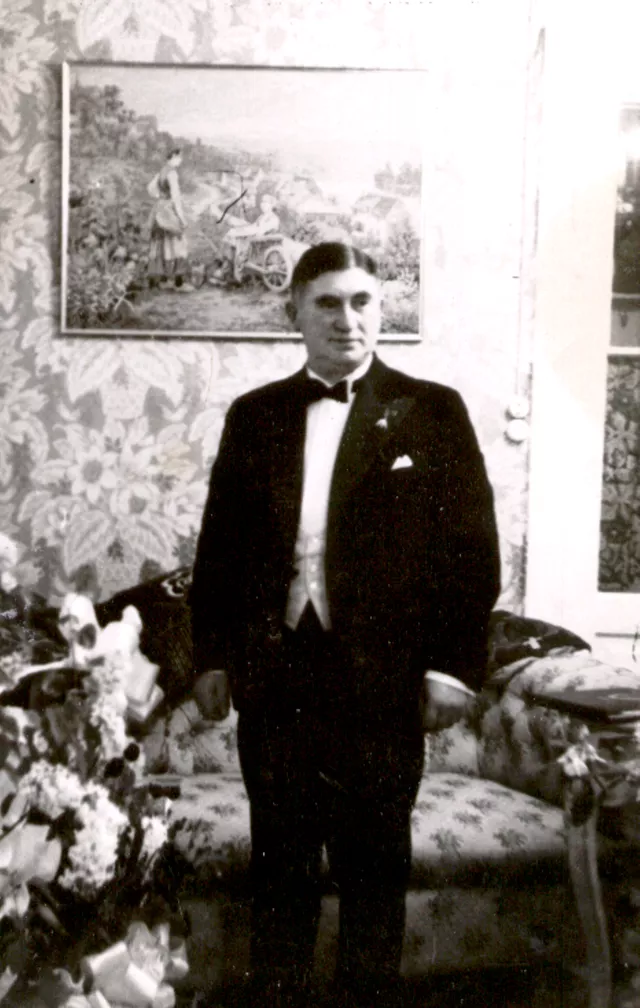Isaac Berkovits
This is my father, Isaac Berkovits, on his 50th birthday. The picture was taken in his apartment in Tallinn in 1936.
There were twelve children in my grandfather's family. Apart from my father Isaac, born on 16th April 1886, I knew only two of them: his brother Iosif and his sister Vikhne. The family was truly Jewish, which was customary for that time. Jewish traditions were kept: they went to the synagogue and observed the Sabbath and Jewish holidays at home.
From his childhood my father helped my grandfather at work; it was from him that my father learned the profession of a tailor. My father said that before the outbreak of World War I he was drafted into the tsarist army. Even as a child, my father had an ear for music and he was admitted to the regiment orchestra. He played the trumpet and violin. Upon his return from the army, my father got married and my parents settled in Tallinn. Of course, they had a traditional Jewish wedding; it couldn't have been any other way.
After getting married both my parents worked. My mother made hats at home and my father was a tailor. They lived modestly, refusing themselves many things. With time they managed to save enough money to open a fabric store. They sold silk and woolen fabric. The store was in the downtown area, located in a thoroughfare and gradually it became prosperous. At first, my mother worked in the store as a cashier. Once the business took off, they hired workers and my mother became a housewife. My father didn't work in the store either, he hired sales assistants. The family was large and my mother had maids.
There were five children in the family. The eldest brother Samuel was named after my maternal grandfather. He was born on 4th April 1915. My elder sister Ida was born on 11th September 1916. My second sister Vera was born on 14th September 1918. Her Jewish name was Dveira. Rudolf was born on 9th November 1919. I, the youngest, was born in 1922. I was named Liya.
When their store became profitable, my father purchased a house for our family. I was born in that house. It was a two-story wooden house in the center of Tallinn. The house was big. There were nine rooms and a large kitchen on the ground floor. There were rooms on the second floor as well. There was a huge, gorgeous orchard by the house. There were apple trees, plum trees, berry bushes and wonderful flowers. My father liked flowers a lot. He ordered buds of some special tulips in Holland. Those tulips grew in our garden.
We mostly spoke Yiddish at home, sometimes German was generally accepted in Baltic countries. All of us knew Russian as well.
My parents were very religious. We respected and observed many Jewish traditions. Friday evening we marked the Sabbath. My mother lit candles and prayed. Then we had a festive dinner. Our house was known for tradition, which implied that anybody could come to us for the Sabbath dinner without invitation. Those who didn't have a place to have their Sabbath meal were hospitably invited to our house. Our relatives always came on Sabbath evening. There were also the visitors who didn't have a chance to get home in time for the Sabbath. We were happy to see everybody.
The next day it was a rule for parents to go to the synagogue. They took the children with them. We went to the synagogue on holidays as well. There was a large, beautiful synagogue in Tallinn; it doesn?t exist anymore, it burned down during the bombing in 1944.
Jews and Estonians were very friendly towards each other. In 1936 my father celebrated his 50th birthday. There were a lot of guests, including his business partners, Estonian entrepreneurs. They didn't find it shameful to come over to a Jew and congratulate him on his birthday.





















